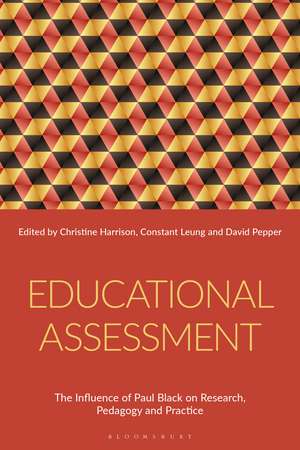Educational Assessment: The Influence of Paul Black on Research, Pedagogy and Practice
Editat de Dr Christine Harrison, Professor Constant Leung, Dr David Pepperen Limba Engleză Hardback – 15 noi 2023
Preț: 541.20 lei
Preț vechi: 774.49 lei
-30% Nou
Puncte Express: 812
Preț estimativ în valută:
103.56€ • 108.41$ • 85.69£
103.56€ • 108.41$ • 85.69£
Carte tipărită la comandă
Livrare economică 05-19 aprilie
Preluare comenzi: 021 569.72.76
Specificații
ISBN-13: 9781350288492
ISBN-10: 1350288497
Pagini: 296
Ilustrații: 10 bw illus
Dimensiuni: 156 x 234 x 23 mm
Greutate: 0.59 kg
Editura: Bloomsbury Publishing
Colecția Bloomsbury Academic
Locul publicării:London, United Kingdom
ISBN-10: 1350288497
Pagini: 296
Ilustrații: 10 bw illus
Dimensiuni: 156 x 234 x 23 mm
Greutate: 0.59 kg
Editura: Bloomsbury Publishing
Colecția Bloomsbury Academic
Locul publicării:London, United Kingdom
Caracteristici
Explores the international influence that Black has had across assessment and pedagogy across the curriculum, including STEM, humanities and social science subject
Notă biografică
Christine Harrison is Professor in Science Education at King's College London, UK. Constant Leung is Professor of Educational Linguistics at King's College London, UK. David Pepper is Lecturer in International Education at King's College London, UK.
Cuprins
List of ContributorsIntroduction, Chris Harrison (King's College London, UK)1. Paul Black - A Reflection On The Journey To Educational Research (1930 - 1976), Simon Black2. Foreword: An Appreciation Of The Contribution Of Paul Black To National Policy On Curriculum And Assessment, Margaret Brown (King's College London, UK)3. Putting Learners At The Heart Of The Assessment System, Dylan Wiliam (UCL Institute of Education, UK)4. Inspiring Change In Classroom Assessment, Gordon Stobart (UCL Institute of Education, UK), Jo-Anne Baird (University of Oxford, UK) and Louise Hayward (University of Glasgow, Scotland)5. Unifying The Purposes Of Teacher Assessment, Wynne Harlen (University of Bristol, UK6. The Revolutionary International Transformation of Educational Assessment, Rick Stiggins (Assessment Training Institute, Portland, USA)7. The Impact of Two Key Themes from Paul Black's Work on U.S. K-12 Policy and Practice, Margaret Heritage and Caroline Wylie (University of California, Los Angeles, USA)8. The role of teachers in making and moderating assessment judgements: Opening the black box to challenge paradigms in Australia, Claire Wyatt-Smith and Lenore Adie (Australian Catholic University, Australia)9. Student Involvement in Assessment: Queensland Teacher Repertoires of Practice, Val Klenowski and Jill Willis (Queensland University of Technology, Australia)10. Assessment for equity: The role of formative assessment, Dennis Alonzo, Chris Davison (University of New South Wales, Australia) and Pasi Salhberg (Southern Cross University, Australia)11. Changing the Culture of Classrooms, Changing the Responsibility of Students, Jo Boaler (Stanford Graduate School of Education, USA)12. Using Research to Inform Practice and Teaching to Shape Research, Paul Spenceley and Chris Harrison (King's College London, UK)13. Mapping the roads of learning: Linking learning progressions with assessments, Mark Wilson (University of California, Berkeley, USA)14. Certificating Learning on the Basis of Teacher Assessment, Paul E. Newton (Ofqual, UK)15. Braiding research, practice, policy and dissemination, Bronwen Cowie (University of Waikato, New Zealand)16. Research design principles for dynamic teacher-researcher collaboration: Two stars and a wish, Natasha Serret (Nottingham Trent University, Institute of Education, UK) and Catarina F. Correia (UCL Institute of Education, UK)Chronological list of Paul Black's key publications
Recenzii
Paul Black's work on assessment for learning has impacted on the work of teachers, their classroom practice, and assessment around the world. After setting out the features of assessment for learning (drawing heavily on "The Black Box" publications), this book presents accounts of how the work has been drawn upon to inform practices internationally. Accessibly written, I believe it will be a "go to" source for anyone interested in assessment for learning and classroom practice.
